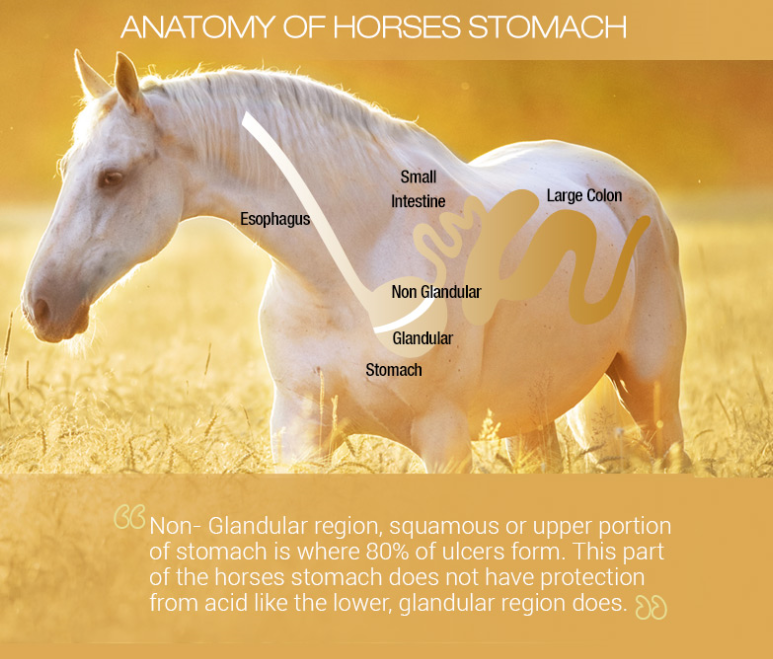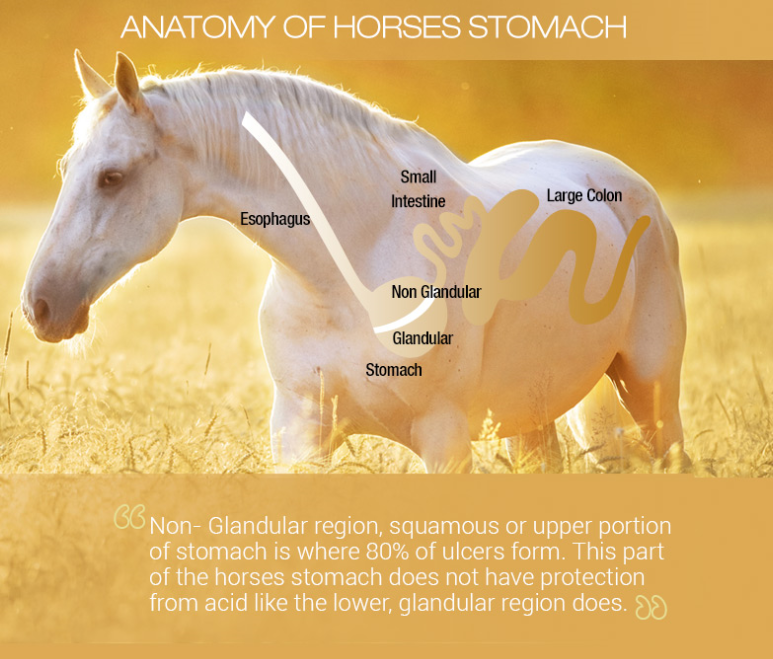We use cookies to make your experience better. To comply with the new e-Privacy directive, we need to ask for your consent to set the cookies. Learn more
Different Types Of Gastric Ulcers In Horses: & How To Treat Them
There are two main types of ulcers that affect horses. These are hindgut and gastric ulcers.
- Gastric ulcers are lesions that forms in the stomach lining. This occurs due to over exposure to gastric acid in the stomach.
- Hindgut ulcers are lesions that form in the horse's large intestine. These are caused by excessive lactic acid as well as a bacterial imbalance.
In this article we willll concentrate on gastric ulcers. You can find links about hindgut ulcer at the end of this article.
The stomach of a horse consists of two parts: the glandular and non-glandular portion. The glandular portion is the bottom part of the stomach and the non-glandular is the top part.
The glandular section of the stomach is responsible for acid secretion. It also contains protective coating that keeps the stomach lining form being damaged.
The non-glandular portion is the upper part of the stomach which functions as a mixer for stomach contents. This part of the stomach does not contain the protective elements of the glandular part.
It is usually in the non-glandular section of the stomach that ulcers appear.

Types of gastric ulcers:
There are three main types of gastric ulceration. These are Glandular, Non-Glandular (also known as Squamous) and Pyloric ulcers.
Tricky, huh?
Non-Glandular or Squamous Ulcers in Horses
Non-Glandular or squamous ulcers are lesions that appears in the upper third of the horses's stomach. Ulcers in this region are caused when the mucosa lining is damaged by bacteria, parasites or over-exposure to stomach acid.
This type of ulcer is are mostly caused by the following:
- An equine incompatible diet comprising of low roughage and high grain.
- A stressful lifestyle with excessive stabling, travel, and competitions.
The non-glandular section of the horse's stomach does not have strong protective barriers against gastric acid, like the lower section does.
Glandular Ulcers in Horses
Unlike the unprotected squamous section, the glandular section of a horse's stomach is designed to cope with high levels of acidity.
The glandular mucosa is lined with mucous, protective proteins, electrolytes, lipids and antibodies. All of these provide natural protection against stomach acid.
Glandular ulcers occur when this protective barrier is weakened. Usually by non-steroidal anti-inflammatories (known as NSAIDs) and bacterial agents.
Pyloric Ulcers in Horses
Pyloric ulcers occur in the pyloric region . This is where the stomach opens to the small intestine. Ulcers in this area can cause swelling and delayed gastric emptying which can cause colic.
If pyloric ulceration gets severe enough it will cause cells to swell, This will result in delayed gastric emptying. A more acidic environment, and potentially colic. Delayed emptying of the stomach is a serious condition and difficult to treat. The causes of pyloric ulcers are the same as gastric ulcers. Namely NSAID and over-use and bacterial agents.
Treating different types of gastric ulcers
Squamous or non-glandular ulcers:
Omeprazole is the best proven treamtent for squamous ulcers. Omeprazole works by suppressing acid production and allowing the ulcers to heal.
Glandular & Pyloric Ulcers:
Omeprazole alone is generally not enough to successfully treat these kind of ulcers. However it still plays an important role in the treatment of these ulcers. However, Omprazole should be use in conjunction with mucosal protectants like sucralfate. Treatment should also include anti-biotics if bacterial involvement is suspected.
To find out more about hindgut ulcers and the appropriate treatment, check out this article.
Purchase ulcer medication for horses
There are two main types of ulcers that affect horses. These are hindgut and gastric ulcers.
- Gastric ulcers are lesions that forms in the stomach lining. This occurs due to over exposure to gastric acid in the stomach.
- Hindgut ulcers are lesions that form in the horse's large intestine. These are caused by excessive lactic acid as well as a bacterial imbalance.
In this article we willll concentrate on gastric ulcers. You can find links about hindgut ulcer at the end of this article.
The stomach of a horse consists of two parts: the glandular and non-glandular portion. The glandular portion is the bottom part of the stomach and the non-glandular is the top part.
The glandular section of the stomach is responsible for acid secretion. It also contains protective coating that keeps the stomach lining form being damaged.
The non-glandular portion is the upper part of the stomach which functions as a mixer for stomach contents. This part of the stomach does not contain the protective elements of the glandular part.
It is usually in the non-glandular section of the stomach that ulcers appear.


Types of gastric ulcers:
There are three main types of gastric ulceration. These are Glandular, Non-Glandular (also known as Squamous) and Pyloric ulcers.
Tricky, huh?
Non-Glandular or Squamous Ulcers in Horses
Non-Glandular or squamous ulcers are lesions that appears in the upper third of the horses's stomach. Ulcers in this region are caused when the mucosa lining is damaged by bacteria, parasites or over-exposure to stomach acid.
This type of ulcer is are mostly caused by the following:
- An equine incompatible diet comprising of low roughage and high grain.
- A stressful lifestyle with excessive stabling, travel, and competitions.
- Gastric splashing.
The non-glandular section of the horse's stomach does not have strong protective barriers against gastric acid, like the lower section does.
Glandular Ulcers in Horses
Unlike the unprotected squamous section, the glandular section of a horse's stomach is designed to cope with high levels of acidity.
The glandular mucosa is lined with mucous, protective proteins, electrolytes, lipids and antibodies. All of these provide natural protection against stomach acid.
Glandular ulcers occur when this protective barrier is weakened. Usually by non-steroidal anti-inflammatories (known as NSAIDs) and bacterial agents.
Pyloric Ulcers in Horses
Pyloric ulcers occur in the pyloric region . This is where the stomach opens to the small intestine. Ulcers in this area can cause swelling and delayed gastric emptying which can cause colic.
If pyloric ulceration gets severe enough it will cause cells to swell, This will result in delayed gastric emptying. A more acidic environment, and potentially colic. Delayed emptying of the stomach is a serious condition and difficult to treat. The causes of pyloric ulcers are the same as gastric ulcers. Namely NSAID and over-use and bacterial agents.
Treating different types of gastric ulcers
- Squamous or non-glandular ulcers:
Omeprazole is the best proven treamtent for squamous ulcers. Omeprazole works by suppressing acid production and allowing the ulcers to heal. - Glandular & Pyloric Ulcers:
Omeprazole alone is generally not enough to successfully treat these kind of ulcers. However it still plays an important role in the treatment of these ulcers. However, Omprazole should be use in conjunction with mucosal protectants like sucralfate. Treatment should also include anti-biotics if bacterial involvement is suspected.
To find out more about hindgut ulcers and the appropriate treatment, check out this article.








Validate your login